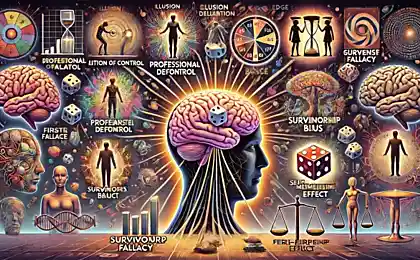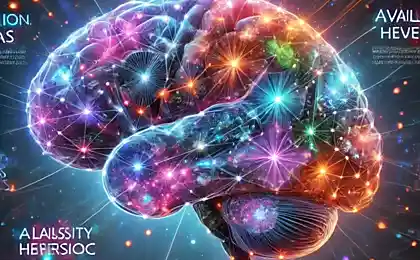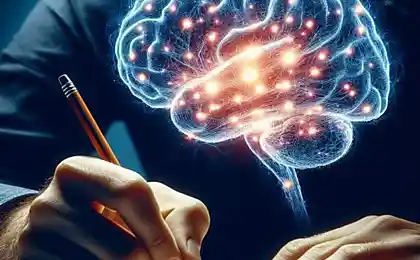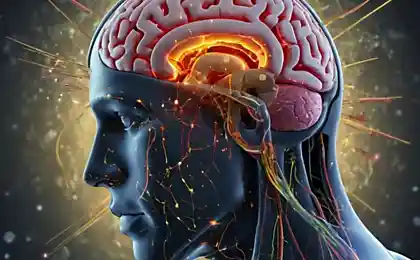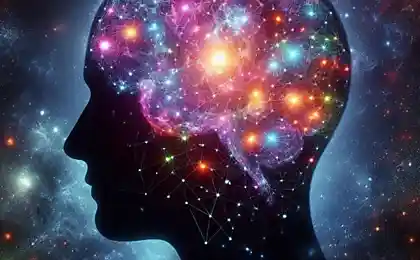713
12 cognitive distortions inherited by mankind from the ancestors, and do not give us a rational perception of reality

The human brain is able to perform 1016 operations per second. No computer on a body of work can not. But it is the human brain - very unreliable device.
Basic Calculator can perform mathematical calculations a thousand times rather than a person. Our memories are subjective, patchy and variable. Our perception and processing of information about the surrounding reality are subject to a variety of small interference.
Inaccuracies and errors in our perception are called cognitive distortions. They appeared out of nowhere - each caused severe evolutionary necessity.
To survive, our ancestors had to think as quickly and efficiently as possible. Our minds are still kept a tendency to choose the shortest path to the evaluation of the new information. Such reductions mental path called heuristics. On the one hand, heuristics help us to make quick decisions in difficult situations. On the other - each of heuristics results in the fact that we focus only on one aspect of a complex problem and is unable to clearly and adequately assess the environmental situation. Here are the twelve most common heuristics.
1.
Confirmation bias We are happy to agree with those people who are willing to agree with us. We go to the sites, which is dominated by the political views close to us, and our friends are likely to share our tastes and beliefs. We try to avoid individuals, groups and news sites that may cause to doubt the correctness of our position in life.
American psychologist and behaviorist B. F. Skinner called this phenomenon of cognitive dissonance. People do not like when their minds are facing conflicting representations: values, ideas, beliefs and emotions. To get rid of the conflict between the settings, we unconsciously look for the points of view that coexist with our views.
The views and opinions that threaten our world view, are ignored or rejected. With the advent of the Internet effect of confirmation bias only increased: to find a group of people, which is always and everywhere with you will agree, is now able to virtually everyone.
2. The distortion in favor of the group
This effect is similar to the confirmation bias. We tend to agree with the opinion of people whom we consider members of their group, and reject the views of people from other groups.
This is a manifestation of our most primitive tendencies. We strive to be at the same time with the members of our tribe. At the level of the neurobiology of this behavior is associated with the neurotransmitter oxytocin. It is a hormone of the hypothalamus, has a powerful impact on the psycho-emotional sphere of man. Immediately after birth, oxytocin is involved in the formation of the relationship between mother and child, and, more broadly, helps us to form strong ties with the people of our circle.
At the same time, oxytocin causes in us the suspicion, fear and even contempt toward outsiders. It is a product of evolution, which survived only those groups of people who have successfully interacted with each other within the tribe and effectively reflect the attacks of outsiders.
Nowadays cognitive bias in favor of the group makes us unduly high estimate the possibilities and advantages of loved ones and deny those of persons unknown to us personally.
3. Rationalization
after purchase Remember when the last time you bought something unnecessary, faulty or just too expensive? You probably a long time to convince themselves that did quite well.
This effect is also known as Stockholm syndrome buyer. It is built into each of our defense mechanism, causing the search for arguments to justify their actions. Unconsciously we seek to prove that the money was well spent. Especially if the money was great. Social psychology explains the effect of the rationalization of a man willing to do anything just to avoid cognitive dissonance.
Having bought something unnecessary, we create conflict between aspiration and reality. To remove the psychological discomfort, really have to give long and hard for what you want.
4. Effect
Player The scientific literature is called the mistake a player or a false conclusion Monte Carlo. We tend to assume that many random events depend on the random events that occurred earlier.
Classic example - the coin toss. We flipped a coin five times. If the eagle dropped more often, we will assume that the sixth time should fall tails. If five times fell tails, we think that for the sixth time required to drop the eagle. In fact, the probability of getting heads or tails at the sixth roll is the same as in the previous five: 50 by 50.
Each subsequent throw coins statistically independent of the previous one. The probability of each outcome is always 50%, but at an intuitive level, a person is unable to recognize this.
A player underestimation of the effect is applied to return the value to the average value. If tails still fell six times, we begin to believe that with a coin that is not right, and that the extraordinary behavior of the system will continue. Then begins the effect of deviations in the direction of a positive outcome - if we did not carry a long time, we begin to think that sooner or later we will come good things.
Similar feelings we experience, setting the stage for a new relationship. Whenever we believe that this time we'll be better than the previous attempt.
5. Denial probability
Few of us are afraid to ride in the car. But the thought of the flight at an altitude of 11,400 meters in Boeing calls the internal trembling almost everyone. Flights - unnatural and somewhat dangerous occupation. But while everyone knows that likely to die in a car accident is much higher than the probability killed in a plane crash.
Various sources define the chances of death in a car accident as 1 to 84, and the probability of dying in a plane crash - 1 in 5000, or even 1 to 20 000. This same phenomenon causes us to constantly worry about the terrorist attacks, when in fact need to be afraid of falling down the stairs or food poisoning.
American lawyer and psychologist Cass Sunstein calls this effect the probability of denial. We are not in a position to properly assess the risk or the risk of a particular class. To simplify the process of risk probability or ignored completely, or it is ascribed crucial. This leads to the fact that we believe the relatively harmless activities hazardous and dangerous - acceptable.
6. Selective perception
Suddenly we begin to pay attention to the appearance of some things, phenomena or objects that are not noticed before. Let's say you bought a new car: everywhere on the streets you see people in the same car. We begin to think that the model of the car suddenly became more popular. Although in reality we just included it as part of its perception.
A similar effect happens with pregnant women who suddenly begin to notice how others around them pregnant women. We are starting to see everywhere a significant number or hear your favorite song to us for us. We seem to have marked them tick in your mind. Then added selectivity of perception is already considered by us confirmation bias.
This effect is known in psychology as a phenomenon of the Baader-Meinhof. The term coined in 1994 by an unnamed visitor Forum Pioneer Press newspaper in the city of St. Paul. Twice a day he heard the name of a radical German Red Army Faction founded by Andreas Baader and Ulrike Meinhof. Very few people able to catch himself on the selective perception of reality. Once we positively bombarded with names of German terrorists, then somewhere brewing some kind of conspiracy!
Because of this cognitive distortion we are very difficult to recognize a phenomenon coincidence ... but this is a coincidence.
7. The effect of the status quo
People do not like change. We tend to make decisions that will lead to the preservation of the current status or the most minimal changes.
The effect of variations in the direction of the status quo is easy to see in the economy and in politics. We hold on to the routine, the bureaucracy, the political parties, we are starting to play chess with the most proven courses and order a pizza with the same filling. The danger is that the potential damage from the loss of the status quo is more important to us than the potential benefit from the new situation or an alternative scenario.
This approach, which holds all the conservative currents in science, religion and politics. The most obvious example - the US health care reform and the protection of patients. Most people in the US for free (or at least cheap) medicine. But the fear of losing the status quo led to the fact that the money for reform have not been allocated and from 1 to 16 October 2013 the US government had to stop their work.
8. The effect of negativity
We pay more attention to bad news than good. And it's not that we're all pessimists. In the evolution of the right reaction to the bad news it was much more important than the right response to the good. The words "this berry delicious" could skip past the ears. But the words "saber-toothed tigers eat people" turn a deaf ear is not recommended.
Hence, the selectivity of our perception of new information. Negative news we feel more authentic - and very wary of people who try to convince us otherwise. In our time, the crime rate and the number of wars is lower than ever before in human history. But most of us are willing to agree that the situation in the world every day is getting worse and worse.
With the effect of the negativity associated the concept of the fundamental attribution error. We tend to explain the actions of other people, their personal characteristics and their own behavior - external circumstances. This again is due to the evolution and selective perception of reality. Get the negative information on unreliable or dangerous members of society openly and promptly react to it for our ancestors were far more important than adequately assess their own behavior.
9. Most of the effects
Man - a being collective. We like to be like everyone else, even though we are not always aware of it, or openly express their nonconformity. When it comes time to choose a favorite, or mass of the winner, individual thinking gives way to the group. This is called the bandwagon effect or imitation.
That's why professional politicians so negatively related to pre-election polls. poll results are quite capable to influence the election results: many voters tend to change their opinion in favor of the winning party in the poll.
But it's not only about global events like elections - most effect can be observed in the family, and in a small office. imitation effect is responsible for the spread of behaviors, social norms and ideas among groups of people, regardless of the motives or grounds have these ideas, norms and forms.
Unconscious human tendency to conformism and cognitive distortions associated with it were demonstrated in 1951 in a series of experiments, the American psychologist Solomon Asch. Students gathered in the audience were shown cards with pictures and asked questions about the length of the lines in the images. Only one student in each group was a real participant in the experiment. All the others were dummies, specifically give the wrong answer. In 75% of these participants agreed with the wrong opinion of the majority.
10. Effect
projection We are very familiar with his thoughts, values, beliefs and convictions. Still, in society itself, we spend 24 hours a day!
Unconsciously, we tend to believe what other people think the same way as we do. We are confident that the majority of others share our beliefs, even if we have to do there is no reason. After projecting your way of thinking to other people very easily. But without special psychological exercises it is extremely difficult to learn to project the thoughts and opinions of others.
This cognitive bias often leads to a similar effect, a false consensus. We not only believe that other people think like us, but also believe that they agree with us. We tend to exaggerate their typicality and normality, and with them overestimate the degree of agreement with our associates.
The views of cults or extremist organizations shared not so many people. But the very members of radical groups believe that the number of their supporters in the millions.
It is the projection of the effect is the belief that we can predict the outcome of a football match, or election.
11. The effect of the moment
Man is very difficult to imagine themselves in the future. Without special training, we are unable to predict future developments, as appropriate underestimate our expectations and correct behavior. We agree on the immediate pleasure, even if it portends a severe pain in the future.
Hence the effect of the moment, also known as the discount revaluation effect. This effect is seriously concerned about economists: from the tendency of people to prefer short-term benefits benefits in the distant future, it follows most of the problems of the world financial system. People are willing to spend money and are extremely reluctant to set aside for a rainy day.
Also, the current situation is well-known nutritionists heuristics. In 1998, American scientists conducted a study "Predicting famine: appetite effects and abstinence of food to choose from." Study participants offered the choice between healthy (vegetables) and unhealthy (chocolate) food, they will receive next week. Initially, 74% of participants chose fruit. But when the day came, and the issuance of food experiment participants were offered the opportunity to change their choice, 70% chose chocolate.
12. Binding Effect
Receiving new information, we correlate it with existing data. This is especially true numbers.
The psychological effect that we choose for a single number as an anchor and compare it with new data, called anchor effect or heuristics binding. Classic example - the value of the goods in the store. If the goods are discounted, we compare the new price ($ 119, 95) is the old amount on the price tag ($ 160). The cost of the actual product at the same time not taken into account. On the anchor effect of the whole mechanism is based discounts and sales: just this week, 25% discount, if you buy four pairs of jeans, one pair you will get for free!
The effect is used and about the preparation of restaurant menus. Next to the super-expensive positions where specifically indicated (relatively!) Cheap. At the same time we react not on the price of the cheapest items, and the difference in price between the salmon steak on the podium of the asparagus and chicken cutlet. Against the background of the steak burger for 650 rubles per 190 seems quite normal.
Also, the effect of the anchor occurs when the choice given three choices: very expensive, average and very cheap. We choose the middle option is that against the background of the other two options seem the least suspicious.






